| کد مقاله | کد نشریه | سال انتشار | مقاله انگلیسی | نسخه تمام متن |
|---|---|---|---|---|
| 993541 | 936040 | 2009 | 9 صفحه PDF | دانلود رایگان |

Explanations for, and indirect evidence of, imperfections in the market for private passenger vehicle fuel economy suggest there is a reasonable case for combining fuel economy standards and fuel or carbon taxes to contribute to an energy policy that aims to reduce greenhouse gas emissions and improve energy security. Estimates of key elasticities, including the rebound effect, indicate that the positive and negative side-effects of fuel economy measures on transport activities and external costs are limited. However, an energy policy for transport does not replace a transport policy that aims to manage the main transport externalities including congestion and local pollution. Conventional marginal cost estimates and standard cost-benefit reasoning suggest that policies that address congestion and local pollution likely bring benefits at least as large as those from fuel economy measures. But the large uncertainty on the possible effects of greenhouse gas emissions constitutes a strong challenge for standard cost-benefit reasoning. Emerging results from methods to cope with this uncertainty suggest that policies to stimulate the widespread adoption of low-carbon technologies in transport are justified.
Journal: Energy Policy - Volume 37, Issue 10, October 2009, Pages 3854–3862